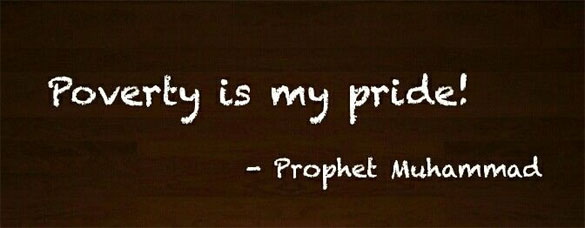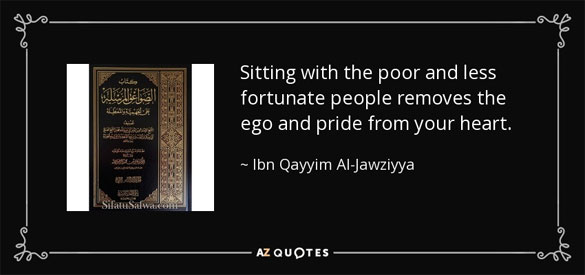
By Arman Neyazi, New Age Islam
2 April 2021
Prophet Muhammad (pbuh) is one from among us but not one like us. He has been sent on this earth as ‘a persona of peace’, ‘Rahmatul Lil Alameen’ for the entire world.
Spiritualism without being at peace with the world is not possible. Prophet Muhammad's life has been an example of the highest degree of Spirituality, Perseverance, Generosity, Humility, Patience, Sincerity, Love, Courage, and above all his habit of putting others first.

The question, therefore is, can a person of perseverance, generosity, humility, patience and a habit of putting others first have any wish of being wealthy? Will his habit of putting others first, humility, generosity and love not make him distribute his wealth among the needy and the destitute? A person of such moral qualities cannot even be imagined to be surrounded with worldly riches and comfort. So when Prophet (SAW) talks of ‘being proud of his poverty’, he talks of being proud of closeness to Allah, as Allah loves people who love His servants.
----------------------------------------------------------------------------------
Also Read: “Poverty is my Pride” said the Messenger of God?
----------------------------------------------------------------------------------
Prophet Muhammad (pbuh) praying to Allah as: "O Lord, keep me one day full fed and one day hungry” needs to be seen in the light of the highest quality of humility and not as the glorification of poverty or asking his Ummah to deviate for the wealth of this world.
Prophet Muhammad (pbuh) is venerated all around the world with titles of highest moral and spiritual standard but he never saw any pride in them; he rather took pride in his saying "Poverty is my pride” and praying to Allah as: "O Lord, keep me one day full fed and one day hungry."
The saying ‘Poverty is my pride’ therefore is basically Muhammad (SAW)’s way of having himself close to the needy and making them comfortable in his company rather than the wealthy people of his time. Islam, thus, is not spread with the power of wealth but with the power of humility and generosity exhibited by the Prophet (SAW).
Sufism and Poverty
The characteristics of the Sufis of every sect and age is not hidden from the eyes of the world. They had everything but wealth. But it is near impossible for a common man to live as they lived. And the Sufis knew wealth brings negative qualities in a man, which in turn makes the man against defy Allah. Thus Sufism and poverty lived together.
There are some Sufi sects, like the Chishtiya Sufis who solely live on charity. They never keep any gift given to them in their possession for more than a day and distribute it to the needy.

Some quotations from books and Sufi scholars are given below:
Dread the loss of poverty more than the rich man dreads the loss of wealth
— Dervish maxim. Reynold A. Nicholson, The Mystics of Islam, 1914. p. 26
To have as few worldy goods as possible seemed the surest means of gaining salvation
— Reynold A. Nicholson, The Mystics of Islam, 1914. p. 26
Some Sufi ascetics rely solely on charity for their sustenance, and the Chishti sect forbids them to keep any gift for longer than a day without distributing it to the needy. Lammens, Henri. "Islam: Beliefs and Institutions", 1968. p. 115
Sufis referred to the voluntary abstinence of food as "the white death", the refusal to new clothes as "the green death" and the purposeful burdening of oneself with trouble as "the black death". (Razzaqm Abdu. "Dictionary of Su'fi Terms" and Hughes, Thomas Patrick. "A Dictionary of Islam", p. 347
The saint Rabia al-Adawiyya was said to have spent her life preaching voluntary poverty and complete reliance upon Allah for all needs. Gettleman, Marvin E. "The Middle East and Islamic World Reader", p. 29
The Quest for Wealth
Islam does not disregard any endeavour to live a life of prosperity if that prosperity in the form of accumulation of wealth does not misguide a person from the teachings of Quran and Ahadith and leads him to a life in heaven, hereafter. There are many Islamic personalities who were super-rich and they never deviated from the righteous path.
Therefore, Muslims should not take, "Poverty is my pride”, as a command from the Prophet (SAW) and deviate from leading a comfortable life. They only have to honour the status of the poor and needy, the destitute and orphans as they have been honoured by Allah in the Quran. Consider the following Ayat from the Quran and act accordingly.
Whatever you give in charity is certainly well known to Allah. Surah Al-Baqarah - 2:273 - Dr. Mustafa Khattab, the Clear Quran
Those who spend their wealth in charity day and night, secretly and openly—their reward is with their Lord, and there will be no fear for them, nor will they grieve. 2:273 - Dr. Mustafa Khattab, the Clear Quran.
Through the above mentioned two verses Allah says that He loves the people who care for the needy and the poor, hence there is no glorification of poverty but the elimination of it through various means which Quran and Ahadees have told.
And Allah Knows the Best
New Age Islam, Islam Online, Islamic Website, African Muslim News, Arab World News, South Asia News, Indian Muslim News, World Muslim News, Women in Islam, Islamic Feminism, Arab Women, Women In Arab, Islamophobia in America, Muslim Women in West, Islam Women and Feminism




 Moderate Islamist here
Moderate Islamist here


0 comments:
Post a Comment